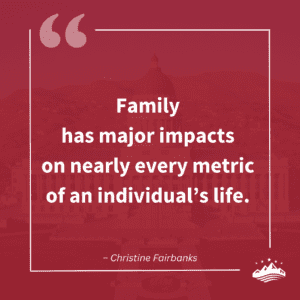
Written by The Likely Voter
April 27, 2023
![]()
Students with involved parents do better in school, and that ought to prompt policymakers to better track family structure data, according to Sutherland Education Policy Fellow Christine Fairbanks. “During my time as a teacher, I saw how family impacted students,” Fairbanks writes in her latest Insights article. “Students whose parents were involved seemed to do better in school or were able to improve when they struggled.”
Fairbanks points out that family structure plays a crucial role in the overall success of children, especially in education. And with education policy being front and center in this past legislative session, Fairbanks says that Utah would be best served to make family structure data publicly available in their reports.
What does it mean for the state to collect and report “family structure” data? Just as the state reports education outcomes broken out by income, gender and race, Fairbanks recommends that the state should also report family composition, “for instance, whether students are from a two-parent household.”
“Family has major impacts on nearly every metric of an individual’s life,” Fairbanks writes. “Therefore, we ought to be collecting and reporting on family structure to make sound policy.” 
Public debate about disparities in education outcomes often highlights race and other factors, but it often leaves out the evidence that family circumstance has a crucial impact on learning outcomes.
By making this data on family structure publicly available, Fairbanks believes, “it helps prevent us from hyper-centering on any one particular narrative,” and allows legislators to “make more informed policy recommendations,” Fairbanks writes.
Family structure not only impacts educational outcomes, it also ties into a multitude of developmental aspects for children later in life, particularly in mental and physical health, as pointed out by Brad Wilcox.
In order to foster more complete dialogue about what impacts Utah student outcomes, Utahns should expect elected officials and education professionals to include family structure in future education policy debates.
The Likely Voter is Sutherland Institute’s voice speaking directly to Utah voters, equipping them with increased knowledge and context to support informed and engaged citizenship.

For a more in-depth perspective on this article, read our Insights piece here.
Read More
What you need to know about the upcoming state party conventions
The two major political parties are about to hold their state conventions. Here’s what you need to know.
Here’s why the First Amendment’s religion clauses are not in conflict
Some suggest there is a tension between protection for the free exercise of religion and the prohibition on the establishment of religion. But a better take is to see the two clauses as congruent.
Is California’s minimum wage hike a mistake?
Is raising the minimum wage a good tool to help low-income workers achieve upward mobility? That’s the key question at the heart of the debate over California’s new $20 an hour minimum wage law for fast food workers.




